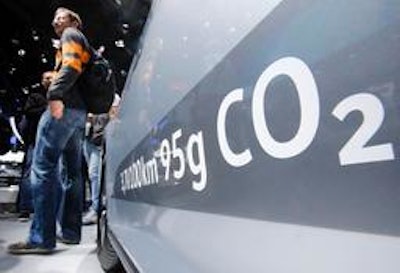

DETROIT (AP) — After months of wrangling with the U.S. government, Volkswagen has agreed to buy back or fix about 482,000 vehicles with 2-liter diesel engines that are rigged to cheat on emissions tests.
Details of the decision announced Thursday in a federal court hearing are still being worked out. Also yet to be decided are what Volkswagen will do with another 90,000 VW, Porsche and Audi brand vehicles with 3-liter diesel engines.
And the government and Volkswagen are still working out fines and penalties for the automaker, as well as ways to fix the environmental damage caused by the cars, which can spew out 40 times the allowable limit for harmful nitrogen oxide.
The case, which is costing the German company billions of dollars, stems from its admission it installed software on 11 million cars globally that turns on pollution controls during government tests and shuts them off on the road.
Here's a look at where the scandal began and where it might be headed.
___
THE ISSUES
The scandal was exposed Sept. 18 when U.S. regulators announced that Volkswagen had put rogue software on 482,000 cars with 2-liter four-cylinder diesel engines. Computers detected when the cars were being tested on treadmills, turning on controls that limit emissions of harmful nitrogen oxide. The controls were turned off when the cars went back on the road. Days later, Volkswagen admitted the software was on 11 million vehicles worldwide. The government says the cheating software was both on small cars with four-cylinder diesel engines, mainly in Volkswagen-brand vehicles, as well as in six-cylinder diesels in Volkswagen, Audi and Porsche cars and SUVs. In Europe, Volkswagen is already recalling and fixing the 8.5 million cars it estimates are in the region.
___
THE CARS AFFECTED
The first batch of affected cars, with 2-liter diesel engines, included the following U.S. models: the 2009-2015 Jetta and Audi A3, the 2010-2015 Golf, and the 2012-2015 Beetle and Passat. The additional software under investigation affects the same cars for the 2016 model year. In Europe, the cars affected are from the same years and include vehicles from the Volkswagen, Audi, Skoda and SEAT brands. The 90,000 cars with V6 diesel engines that the EPA says also cheated include the Audi Q7 and Volkswagen Touareg SUVs from the 2009 through 2016 model years, as well as the Porsche Cayenne from 2013 to 2016. Also covered are Audi A6, A7, A8, and Q5s from the 2014 to 2016 model years, according to the EPA.
___
THE IMPACT ON VOLKSWAGEN
The scandal has damaged the brand and drawn anger from customers who bought diesel cars thinking they were clean. It's also draining Volkswagen's treasury. The company has set aside 6.7 billion euros ($7.61 billion) to cover the cost of recalling cars, but analysts say the final bill from lawsuits and lost sales could be several times higher, almost 30 billion euros ($34 billion). Volkswagen will provide more detail when it releases its earnings figures for the fourth quarter on April 28.
Sales have lagged competitors. In March, global sales for all of VW's brands slipped 0.2 percent, hurt by drops of 3.7 percent in the United States and 2.5 percent in the company's home market, Germany. Meanwhile, Volkswagen's ordinary shares have tumbled 18 percent since the scandal was revealed, and the total market value of the company has fallen by 11.2 billion euros — equivalent to $12.72 billion today — to 65.79 billion euros.
___
WHAT OWNERS SHOULD DO
All they can do is wait. Judge Breyer gave the lawyers until June 21 to hammer out details of the compensation and buyback offers, as well as fines against Volkswagen and ways to mitigate the cars' pollution. After that date, the details will be made public and owners can comment. They don't need to take any action until they get a formal letter in the mail. Volkswagen has hired compensation expert Kenneth Feinberg to handle owners' claims. But it's not clear when he'll start taking applications. Owners could also join one of the hundreds of class-action lawsuits alleging the cars have lost value. Or try to sell their cars, but experts say it's wise to hang on until the final announcement. Regulators say the cars are safe to drive, even though they pollute too much. The fix will mean software changes and could include installing a treatment chemical with a tank. Volkswagen's former U.S. CEO said the fixes may hurt performance but not the window sticker mileage numbers.
___
WHAT'S NEXT
Volkswagen is waiting for the results of an investigation by law firm Jones Day on what led to the scandal. It is expected to shed light on how many employees were involved in cheating on the emissions tests. The company will next week report its earnings, in which it will provide detail on the financial impact of the scandal.
Beyond that, it will likely take years to solve legal disputes. Volkswagen faces big fines from governments and possible criminal charges. Employees also are likely to be charged. Investors are suing the automaker, and attorneys for hundreds of owners filed a consolidated complaint in February that seeks class action status.
VW still can't sell 2016 model 2-liter diesels in the U.S. because they haven't been certified by the EPA as complying with emissions laws. The company also stopped U.S. sales of its six-cylinder diesels last year.






















